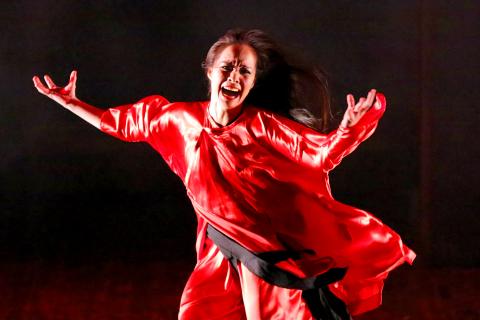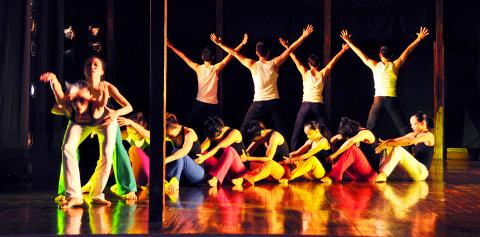The protests in Hong Kong are the focus of this year’s Tsai Jui-Yueh International Dance Festival (第十四屆蔡瑞月國際舞蹈節) in Taipei.
The annual festival, which commemorates the life and work of Taiwanese modern dance pioneer and human rights activist Tsai Jui-yueh (蔡瑞月), is held in the first weekend of November at the Rose Historic Site (玫瑰古蹟), the (rebuilt) Japanese-style house that was home to Tsai’s China Dance Club for decades.
Tsai, who was jailed as a political prisoner for three years on Green Island during the White Terror era, moved to Australia in 1983 to join her son, who was a dancer with the Australian Dance Theatre under Elizabeth Dalman. She left the China Dance Club in the hands of two former students, her daughter-in-law, Ondine Hsiao (蕭渥廷), who now chairs the Tsai Jui-Yueh Dance Foundation, and her sister, Grace Hsiao (蕭靜文), whose own troupe preserves Tsai’s works.

Photo courtesy Wang Jya-ming
Since Tsai’s death in Australia in 2005, the foundation, the memorial festivals and the Rose Historic Site have taken a prominent role in promoting Taiwan’s human rights movement.
For this year’s festival, the 14th, Ondine Hsiao decided to focus on support for the anti-extradition bill/pro-democracy protests now in their fifth month in Hong Kong, hence the title of the program, Umbrella in a Red Typhoon (抵抗紅色帝國), although a more exact translation of the Chinese characters would be “resisting the red empire.”
“We’re shouting against the red empire — China — and umbrellas are a symbol of the Hong Kong protests. David actually came up with the English title,” Grace Hsiao said in a telephone interview, referring to her husband, musician David Maurice.

Photo courtesy of the Tsai Jui-Yueh Culture Foundation
She said they were really excited to get famed South Korean dancer Lee Ae-ju, who will perform Taepyeongmu, or “great peace dance,” which is one of South Korea’s important cultural treasures, for the show.
Lee, a retired professor of traditional Korean dance at Seoul National University, gained fame in her home country during the June Democracy Movement protests in 1987, when she performed before a crowd of about 1 million gathered at Seoul Plaza for the funeral of student activist Lee Han-yol, who died in hospital after being injured in a clash with riot police.
A white-clad Lee Ae-ju’s shamanistic-inspired dance, inspired by the torture and suffering of dissidents, was aimed at consoling the activist’s soul and appeasing the political grudges that had divided the nation.

Photo courtesy of Lin Yi-hsi
This is the first trip to Taiwan for Lee Ae-ju, who has brought four musicians with her.
“We are really lucky to have her,” Grace Hsiao said, adding that many Taiwanese activists had been eager to meet her.
As usual, the program for the festival features works by Tsai, as well as her Japanese teacher, Ishii Baka, and other choreographers whom she admired or have followed her passion for socially progressive works, including Colombian-American activist dancer Eleo Pomare.
Excerpts from Pomare’s 1990 work, Homemade Ice Cream, a suite of seven dances that is a satirical look at American myths and religious fundamentalism, will be performed.
Tsai’s powerful 1953 solo work, The Priestess (女巫), will be performed by Kuo Nai-yu (郭乃妤), who danced with both the Martha Graham Dance Company and the Cloud Gate Dance Theatre (雲門舞集).
One choreographer/dancer invited this year has a more tangential connection to Tsai, through his mentor, Dalman.
Hans Ahwang, from the Torres Strait Islands off the coast of Queensland, Australia, first visited Taiwan four years ago as a member of Dalman’s Mirramu Dance Company.
Torres Strait Islanders have a tradition of oral history transmitted through songs and dances, which tell not only of daily life and cultural mythology, but also the weather and the waters surrounding the islands.
Ahwang said he will be performing four pieces, two of which tell of the northwest wind, one that tells of the noise and lighting that sweeps down from Papua New Guinea, and one that is a “fusion mix of traditional and modern.”
He uses bamboo to create a soundscape for the two “Kuki” pieces about the wind, he said, while the fusion piece is propelled by drumming.
More information on the festival and the Rose Historic Site can be found on the Tsai Jui-yueh Dance Research Institute’s Web site: sites.google.com/dance.org.tw/studio.

One of the most important gripes that Taiwanese have about the Democratic Progressive Party (DPP) is that it has failed to deliver concretely on higher wages, housing prices and other bread-and-butter issues. The parallel complaint is that the DPP cares only about glamor issues, such as removing markers of Chinese Nationalist Party (KMT) colonialism by renaming them, or what the KMT codes as “de-Sinification.” Once again, as a critical election looms, the DPP is presenting evidence for that charge. The KMT was quick to jump on the recent proposal of the Ministry of the Interior (MOI) to rename roads that symbolize

On the evening of June 1, Control Yuan Secretary-General Lee Chun-yi (李俊俋) apologized and resigned in disgrace. His crime was instructing his driver to use a Control Yuan vehicle to transport his dog to a pet grooming salon. The Control Yuan is the government branch that investigates, audits and impeaches government officials for, among other things, misuse of government funds, so his misuse of a government vehicle was highly inappropriate. If this story were told to anyone living in the golden era of swaggering gangsters, flashy nouveau riche businessmen, and corrupt “black gold” politics of the 1980s and 1990s, they would have laughed.

It was just before 6am on a sunny November morning and I could hardly contain my excitement as I arrived at the wharf where I would catch the boat to one of Penghu’s most difficult-to-access islands, a trip that had been on my list for nearly a decade. Little did I know, my dream would soon be crushed. Unsure about which boat was heading to Huayu (花嶼), I found someone who appeared to be a local and asked if this was the right place to wait. “Oh, the boat to Huayu’s been canceled today,” she told me. I couldn’t believe my ears. Surely,

When Lisa, 20, laces into her ultra-high heels for her shift at a strip club in Ukraine’s Kharkiv, she knows that aside from dancing, she will have to comfort traumatized soldiers. Since Russia’s 2022 invasion, exhausted troops are the main clientele of the Flash Dancers club in the center of the northeastern city, just 20 kilometers from Russian forces. For some customers, it provides an “escape” from the war, said Valerya Zavatska — a 25-year-old law graduate who runs the club with her mother, an ex-dancer. But many are not there just for the show. They “want to talk about what hurts,” she